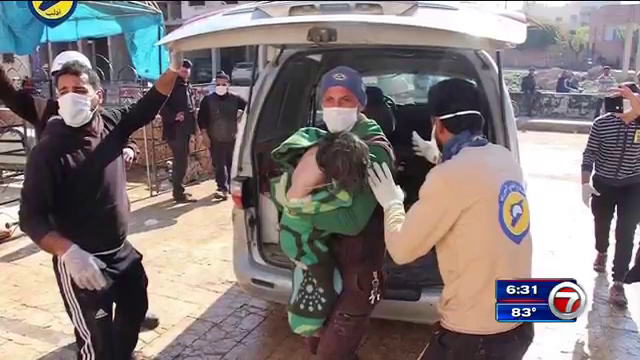BEIRUT (AP) — The international body on chemical weapons control is testing samples from a suspected nerve gas attack that killed at least 87 people in Syria last week and could produce a report on the matter within three weeks, the British delegation to the commission said Thursday.
The report comes one day after Russia vetoed a Western-backed U.N. Security Council resolution demanding a speedy probe into the April 4 attack on Khan Sheikhoun. U.S. Ambassador to the U.N. Nikki Haley said the veto left Moscow with “a lot to prove.”
The Organization for the Prohibition of Chemical Weapons has a standing fact-finding mission on Syria to investigate alleged chemical weapons attacks, but does not apportion blame. The OPCW’s executive council held a session of its executive council on Thursday to address the attack on Khan Sheikhoun, in the rebel-held province of Idlib, northern Syria.
Britain’s delegation to the OPCW tweeted from the executive session that the “Fact Finding Mission is working to gather evidence” and has already started testing samples in a lab.
The U.S. blamed the Syrian government for the attack and fired 59 missiles at an air base in central Syria killing nine people.
Russia’s foreign minister, Sergey Lavrov, said Thursday he expected the OPCW to conduct an extensive probe into the attack, and insisted the organization visit both Khan Sheikhoun and the air base struck by U.S. missiles. But Moscow vetoed a Security Council resolution that would demand a speedy investigation a day earlier. Russia is a steadfast backer of the Syrian government amid that country’s bloody 6-year civil war.
In northern Syria, U.S.-backed Kurdish forces announced they launched the fourth stage of their operations against the Islamic State group, amid reports from activists that the group has suffered a spate of casualties.
The Syrian Democratic Forces, which include Arab fighters, say they are working to clear Islamic State militants out of the Jalab Valley, north of Raqqa, a city held by the extremists with an estimated population of 300,000. The SDF say their goal is to ultimately recapture the city, which has served as the de facto capital the so-called Islamic State.
The SDF says it wants to isolate Raqqa before attacking it. Their closest position is within 8 kilometers (5 miles) northeast of the city. But the countryside south of Raqqa is still under IS control. It is unclear how many stages are planned for the SDF campaign.
The campaign has come at a cost to the predominantly Kurdish forces, which receive ground and air support from the U.S. military and other allies. The Britain-based Syrian Observatory for Human Rights monitoring group reported 25 SDF fighters were killed in the last two days of battle, while the activist-run Raqqa is Being Slaughtered Silently group said on Wednesday that three days of mourning were to be held in a border town held by the SDF after the arrival of the bodies of 15 fighters from the battle. There was no comment from the SDF.
The Syrian army meanwhile issued a statement saying that the U.S.-led coalition attacked a position of the Islamic State group in the eastern province of Deir el-Zour, killing hundreds of fighters and civilians, many of them from poisonous gas.
It said after the airstrike left white smoke billowing from the area then then turned to yellow “most likely because of the explosion of a large warehouse containing large quantities of toxic substances.” It said that the airstrike showed that militants have chemical weapons in their possession.
Opposition activist Omar Abu Laila, who is from Deir el-Zour and currently lives in Europe, denied that hundreds of people were killed in the village of Hatla as a result of poison gas. Abu Laila who is with Deir Ezzor 24 activist group that has reporters throughout the eastern province that borders Iraq also denied there was such such an airstrike.
Copyright 2024 The Associated Press. All rights reserved. This material may not be published, broadcast, rewritten or redistributed.

